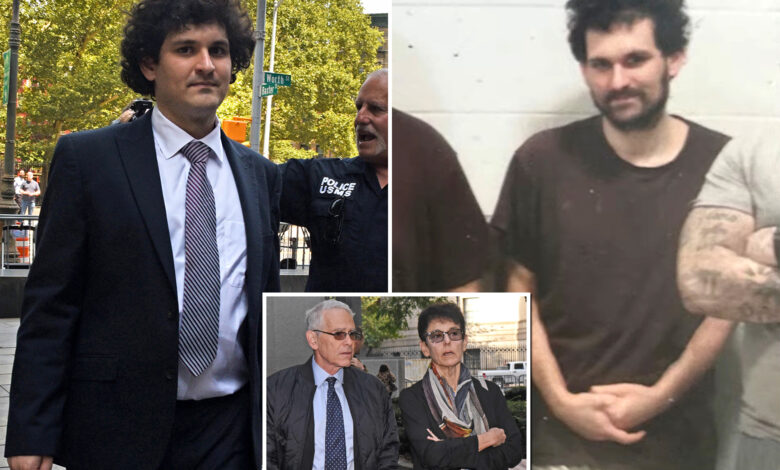Sam Bankman-Fried faces decades in prison as he’s sentenced today

Sam Bankman-Fried faces the prospect of decades in prison as he is sentenced on Thursday — five months after being found guilty of stealing more than $8 billion of funds from customers of his now-bankrupt cryptocurrency exchange FTX.
The 32-year-old convicted fraudster will learn his fate at a Manhattan federal court hearing set for 9:30 a.m., capping an epic and swift fall from grace.
Sporting a now-infamous scruffy hairdo and uniform of a t-shirt and khaki shorts, Bankman-Fried had emerged as crypto’s friendly face in the US before his platform’s sudden November 2022 meltdown.
With his company worth $40 billion at its peak, the tech mogul flew around on private jets, showered politicians who he thought might be crypto friendly with millions in donations, and even palled around with celebrities at the Super Bowl.
But weeks after his platform’s collapse, he was arrested in the Bahamas and charged with swiping FTX user funds to plug a $8 billion debt at his failing hedge fund Alameda Research.
In November last year, a jury found that the ex crypto golden boy had looted the accounts of what prosecutors called “tens of thousands” of people — including in war-torn and unstable nations — who lost the nest eggs they entrusted to him.
He was also found guilty of defrauding FTX’s lenders by sending them phony balance sheets, and of lying to the company’s investors. He earned roughly $3 billion in ill-gotten gains from those schemes, prosecutors said.
Bankman-Fried has been in jail since August after US District Judge Lewis Kaplan revoked his bail after finding that he tampered with witnesses, including by leaking his ex-girlfriend Caroline Ellison’s diary to a journalist.
The feds asked Kaplan to sentence Bankman-Fried to 40-to-50 years in prison after his conviction on seven counts of fraud and conspiracy.
Lawyers for the disgraced crypto ace called for him to instead serve only 5¼ to 6½ years.
Bankman-Fried, who swapped out his unkempt look for a coiffed hairdo and suit and tie during the month-long-trial, took the stand in his own defense — which did not go well.
He claimed more than 100 times that he could not “recall” details about his business — like repeatedly promising that his platform was “safe” — before being confronted with a mountain of evidence revealing that he said dozens of things he claimed not to remember.
The fallen crypto prince also gave no indication during his four-day stint on the stand that he felt any remorse for customers whose money vanished during FTX’s implosion.
“Even now Bankman-Fried refuses to admit what he did was wrong,” prosecutors wrote in a court filing earlier this month. “His life in recent years has been one of unmatched greed and hubris; of ambition and rationalization; and courting risk and gambling repeatedly with other people’s money.”
Three of his former business partners — including his ex Ellison, Alameda’s former CEO — pleaded guilty to their own fraud raps and flipped on him, testifying that the cocky math whiz set up a secret system allowing the hedge fund to have “backdoor” access to the exchange’s cash.
Bankman-Fried also used FTX customer funds to make more than $100 million in political contributions before the 2022 elections and to buy a ritzy $40 million Bahamian penthouse where he and his colleagues lived and worked, prosecutors said.
In total, the feds asked the judge to order Bankman-Fried to pay $11 billion in restitution — $8 billion to customers, $1.7 billion to investors and $1.3 billion to lenders — to make everyone whole.
According to his attorneys, the feds unfairly painted the MIT grad during the trial as a “supervillain” stealing from his customers to live the high life — while he was never in fact driven by greed.
The convicted fraudster was actually solely motivated by donating his riches to charitable causes, his lawyer Marc Mukasey claimed to the court.
Bankman-Fried cannot enjoy “fancy and expensive” things at all in fact because he suffers from a condition known as “anhedodia,” which is “characterized by a near-complete absence of enjoyment, motivation, and interest,” the lawyer argued.
The tech whiz’s mother, Stanford Law professor Barbara Fried, also urged the judge to give her son a lighter sentence because he has exhibited behavior consistent with people on the autism spectrum.
Bankman-Fried’s failure to read social cues will put him in “extreme danger” in prison, his mother warned.
“I genuinely fear for Sam’s life in the typical prison environment,” Fried wrote to the court.
Bankman-Fried’s lawyers also argued that his sentence should be lessened because, according to them, FTX’s customers and lenders will be able to recoup their losses through the company’s bankruptcy filing.
But federal prosecutors pushed back on that claim, saying in court papers that it’s “far from clear” that anyone will be made whole during that process.
A separate trial over Bankman-Fried’s alleged campaign finance violations that could have shed more light on his history of political donations — which include hefty contributions to Democrats like President Joe Biden and undisclosed “dark” payouts that benefitted top Republicans — was scuttled in December.
Prosecutors said that there was a “strong public interest” in sentencing Bankman-Fried as soon as possible given that the sentencing could include a massive forfeiture set aside for victims.
The feds had also yet to secure permission from Bahamian officials that they needed to pursue the campaign finance charges under an extradition deal, US prosecutors said.
Bankman-Fried had also been hit with an explosive charge of bribing at least one Chinese official $40 million to help unfreeze a trading account that he owned, but that allegation also never made it to trial.
He has continued to maintain that he did not commit any crimes, and plans to appeal his conviction.




